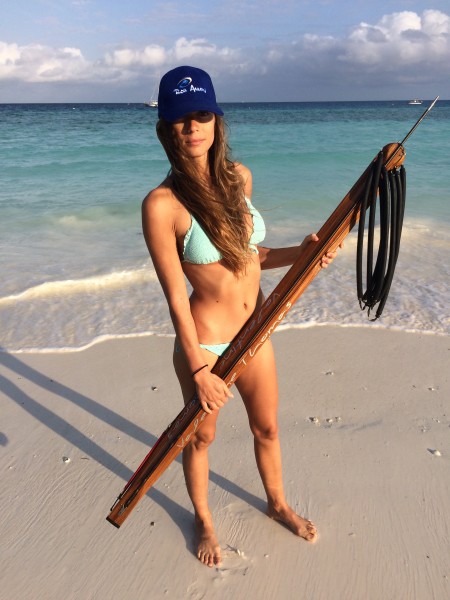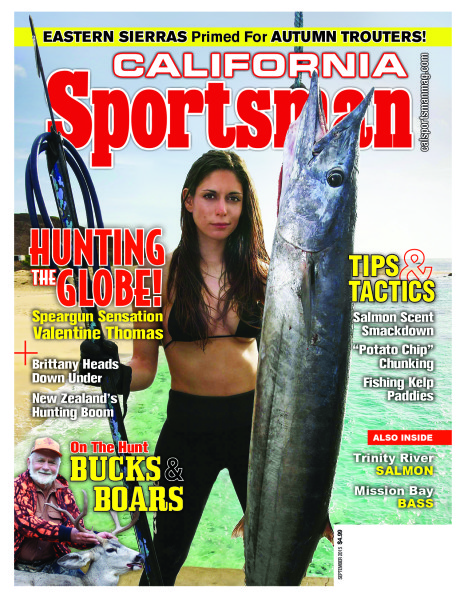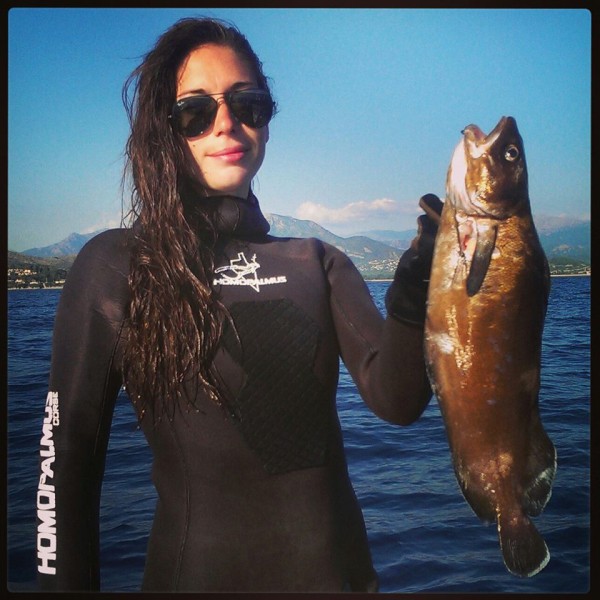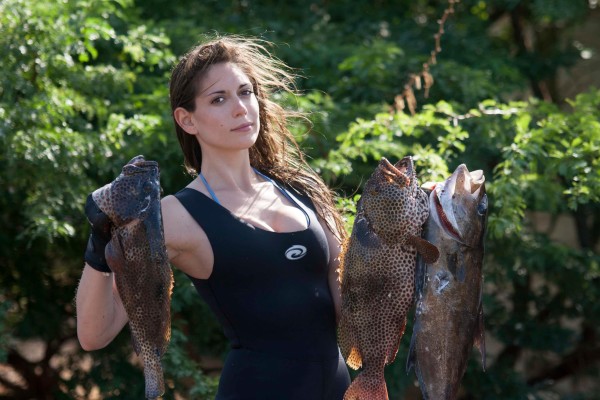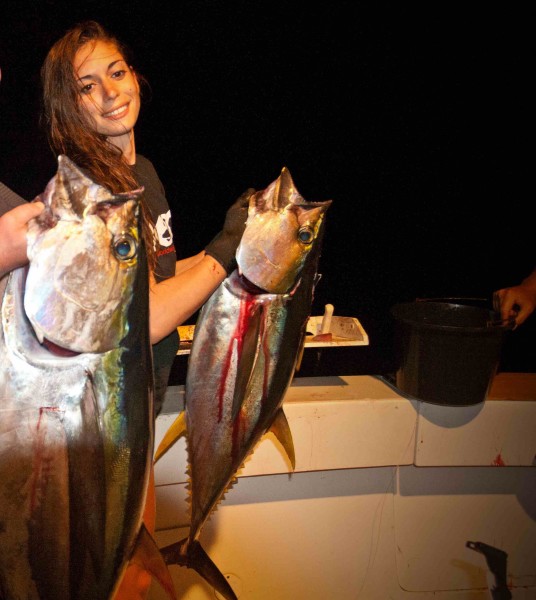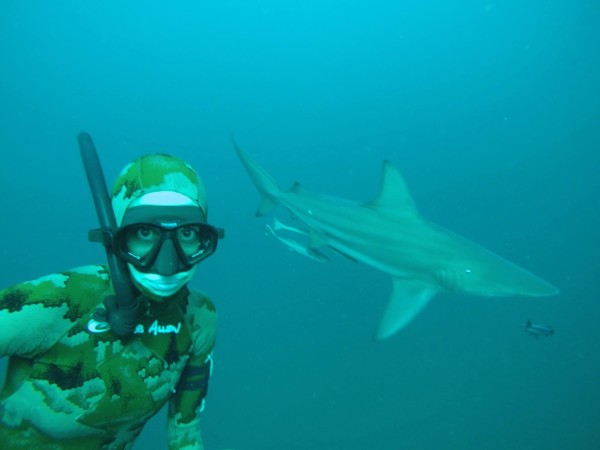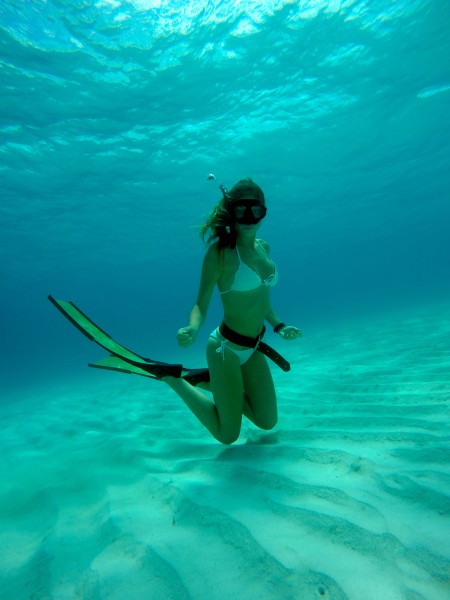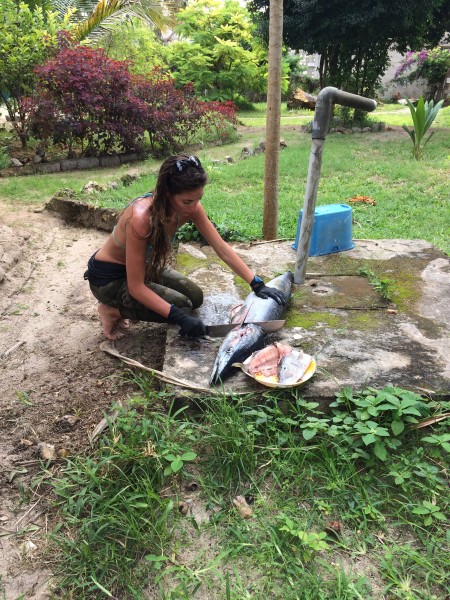Have Spear Will Travel
The following story currently appears in the September issue of California Sportsman:
By Chris Cocoles
She’s so comfortable – if not at home – in the water now, it’s hard to believe Valentine Thomas once almost drowned in it.
Of course, that was a half a lifetime ago, when this spearfishing maven from London via Canada was vacationing seaside with her family in the south of France. Just 14, Thomas got caught in an undertow – not far from the shore, but far enough for a harrowing few seconds.
“I was caught by the underwater currents. The current had suddenly changed and I remember sticking my head up and there was nobody in the water,” says Thomas, now 28. “I just thought, ‘What the hell is happening?’ I was trying to swim and I could not swim anywhere. I was about 2 meters (about 6½ feet) away from the shore and somehow I got dragged to the bottom. I remember at one point saying to myself, ‘I can’t fight this anymore.’ Finally, a lifeguard managed to fish me out of the water. It was pretty intense.”
The irony is that you can now mostly find this former London hedge fund capital businesswoman underwater with speargun in hand. She not only learned how to freedive, but her top passion is spearfishing whenever she has the time to get out of London and hit exotic locales like Corsica, Greece, South Africa and Zanzibar. In 2013, she established a spearfishing world record for a 25.4-pound Atlantic jack caught off far-flung Ascension Island in the south Atlantic Ocean.
And she hopes to make spearfishing a career and someday host her own TV show to educate audiences about dismissing gender bias and the importance of sustainable eating of harvested fish.
“I would show that if I can do it, anyone can,” she says.
We chatted with Thomas from her home base in London about conquering her fear of water and falling in love with the sea.
Chris Cocoles How did you get involved in spearfishing?
Valentine Thomas It started about five years ago. I had a friend who was doing a freediving course (that Thomas also completed), and after that he and his friend were planning a fishing trip (to Ascension Island, a 34-square-mile piece of volcanic rock with 880 inhabitants between South America and Africa) and asked me if I wanted to tag along. It was quite a unique trip. And I fell in love completely with the sport. My first fish (a black jack) weighed 12 kilos (about 26 pounds), and I thought, “OK – I think I’m going to enjoy this trip.”
CC You also had a mishap in the water that trip, right? Did you have fear going in for the first time?
VT To be honest, I was petrified. I was looking in the water and thinking, “There’s no way I’m jumping in that water.” We’re like 5 miles from the (shore) and it’s raining. The sea was looking pitch black and there was no way I could do this. My friend said, “No, it’s fine.” They went in the water first and they were showing me that everything was going to be OK. And they were right, in a way, in that as soon as I hit the water, everything lit up. You can see everything underwater so clearly. And I thought it was so incredible. But I (got caught in the current) and was completely freaking out. The current was picking up and a guy was really struggling to swim back to the boat. He said he was going to fix the boat and he’d be back. So I was like, “OK; I’ll wait here, I guess.” And he ended up leaving me for like 40 minutes and he was still not back. So I was freaking out a little bit. And my buddy – I couldn’t find him, either. So I was in a complete panic.
CC After your traumatic experience as a teenager in France, were you terrified when you first went in the water after that first spearfishing trip and being left alone for a long time? Was that a psychological barrier?
VT It was a really big step for me to get back in the water and to be comfortable with it. It took me a long time to get over that (near drowning in France). I didn’t want to go swimming other than in Caribbean-type, flat, boring water. Anything else I was like, “No, thank you.”
CC So when you made it back to the boat at Ascension Island, were you thinking, “I’m never going to do this again,” or was it “This is exciting?”
VT I was still really excited, but at the time, I was a little bit nervous. For about two years, whenever I’d go out I’d have a line in the water and the other end on the boat to make sure nothing went wrong. I always had to make sure the boat was close to me; otherwise, at that time, I just couldn’t really do it.
CC I know your dad was a sailor and influenced you, but were you an outdoorsy person growing up in Montreal?
VT My dad used to build boats himself when he was in his early 20s, so I took a lot from him. My parents had a place in the countryside near Montreal, so we’d spend our weekends in the outdoors and have fun in the woods, basically. So I’ve been quite used to being outside and obviously I liked it.
CC Did you do any ice fishing in Quebec in the winter?
VT I never tried ice fishing. I’m a very, very cold person who is always freezing [laughs]. So I tend to stay away from the cold.
CC When did you finally get comfortable in the water?
VT (It was) My biggest obstacle. That’s what took me the longest time. After that, the more you’re in the water, the more you can get close to the fish easier; how to act and how to behave next to them. Then you can learn the best way to hunt them.
It took me a long time –probably two or three years – to be able to finally not have to glance back at the boat every two minutes. I no longer had to check to see if the shore was too far away. But when you do something like blue water hunting (diving for fish in the open ocean), you’re 5 or 6 miles away from the shore. There’s no one else around you. Sometimes the water can be 200 meters (about 650 feet) deep under you. So you need to be calm and get used to it. I think the instinct is you’re going to feel like the prey because you think about sharks. So I learned that you have to transform your mind and make yourself into the hunter.
CC You’ve met some great people along the way. Did they also help you evolve in the sport?
VT By traveling to different locations all the time and meeting so many people, these are people who have been doing this as part of their lifestyle. That’s why when people ask me if I have a mentor, I don’t have one mentor because the fishing is so different in different locations. Everybody (I’ve encountered) has different expertise. So I’ve tried to pick a little bit of knowledge of people from around the world.
CC It must have been a cultural experience for you as well.
VT Exactly. I’ve had a chance to travel a lot and in various locations, and I’ve had a chance to have quite a global experience enjoying the sport. I think that’s part of what I love about it, too, is you go fishing somewhere or you get invited – sometimes by people I’ve never met before. They take me fishing on their boat and I live with their families and in their house; I eat dinner with their kids and I get to meet their friends. I get to be a part of their culture as well. So you really immerse yourself into a different world when you’re traveling. That’s what makes it absolutely beautiful.
CC Can you share a couple of memorable experiences in the water? You swam with sharks (off Durban, South Africa), which had to be a major adrenaline rush.
VT That was one of the most exciting and fearful moments of my life. First off, we were in the boat and you could see them on top of the water – the dorsal fins would break the surface. The (divers) told me I had to jump in and I said, “Do I? OK, fine.” I waited for my friend to get in the water first, but I did it. When I jumped in, there were sharks everywhere; there had to have been 20 or 30 sharks surrounding us. It was quite interesting. And I couldn’t stop staring. Maybe after about two minutes a shark came really close – almost nose to nose with me. I backed up, which is something you never do because you’re acting like the prey. So they told me to go toward them, which is easy to say but a little bit harder to do. Later, I was going back down and wasn’t sure where I was looking. I did a head-to-head with a shark, and he went one way and I went the other. We both looked at each other and were scared to death. But I don’t think he was as scared as I was. But when I got out of the water, I told my friend this was probably the best day of my life.
CC How have you handled the derogatory responses you’ve received through your Instagram and Facebook pages, and from the media coverage that jumped on the train this year? Is it just the reality of where we are that you’re treated so much differently than men in your sport?
VT It’s a double-edged sword. In some ways it’s a big advantage to be a woman. Most of the people would have not talked about me and what I was doing if I’d been a man. So I get the attention, even though sometimes it’s been negative and others positive. This has given me publicity and some attention from TV producers to maybe achieve my dream sometime. It really works in my favor. And I would say that 90 percent of the feedback I’ve received has been positive, which is quite surprising. I think a woman who hunts on land, she’s going to get trashed at 95 percent. People seem to have different eyes when it comes to fish.
CC Earlier this summer you posted a passionate Instagram message about the killing of “Cecil” the lion in Africa, citing so many other instances of animal cruelty that generally go undetected. Was it important to stand by your principles, knowing you were going to be criticized?
VT I know my post was a little bit too emotional. But for me, it was just so frustrating knowing that the entire world is eating burgers and steaks and they’re crying for one lion. It’s so absurd.
CC Are there places you are eager to visit and fish?
VT Madagascar for sure I want to try. Australia I’m undecided about because there are so many great whites. And I really want to go to Mexico.
CC Have you been to California?
VT I went to Southern California with my sister once, but I didn’t get to do any fishing. I think the water is pretty cold and not too clear. Murky water means there’s a bigger chance to run into sharks. But I’ve heard it’s a little warmer and clearer around San Diego. But I definitely (wouldn’t mind living there), as I’m ready to start thinking about moving away from London. I can’t take this rainy, horrible weather for too much longer. CS
Editor’s note: For more on Valentine Thomas, follow her on Instagram (@valentinethomas) and Facebook (facebook.com/valentine.tb).
Sidebar
EATING WHAT YOU HARVEST
“Do it all, eat it all.” So says one of Valentine Thomas’ Instagram (@valentinethomas) captions as she fillets a fish on a tropical beach.
Some of her noteworthy hashtags include #catchyourownfood; #doitall and #useitall; #sustainableeating; and #eatwhatyoukill.
“It’s very important to me,” Thomas says of and not wasting what she harvests with her speargun. “Cooking is one of my passions and one reason why I fell in love with fishing. There’s something about cooking food that’s as fresh as it could be. Cooking is as big a part of the sport as (catching). I gut it, I fillet it and I do everything myself. It’s by far one of my favorite things in the world to do.”
Thomas’ passion for using a speargun underwater to catch her dinner was bound to create a stir on social media, where she endures online salvoes that accuse her of being a “killer.” Sometimes, though, Thomas will receive an actual poignant query from a follower who may disagree or, at worst, doesn’t understand what she does.
“Someone on Facebook – a complete stranger – sent me a message. And he asked me a question that made me sit down and think,” Thomas says. “He asked me, ‘Do you enjoy the killing part?’ That’s a really good question, and I was thinking, ‘No, I actually don’t like the killing; I feel quite sad about it. You feel compassion. I love this sport because spearfishing is about everything that’s surrounding you; you’re surrounded by unusual things. It makes you feel so vulnerable. It’s not something that should delight you. It’s actually very haunting.”
The bottom line for Thomas is this: “I’m trying to catch my dinner.”
And other people’s dinners. On a trip to South Africa, Thomas and her party made sure to get some extra fish to distribute to needy families in impoverished areas. In July, she did something similar when she fished on Zanzibar, a tropical island off the coast of Tanzania. Thomas understands that Instagram and Facebook commenting is less about common sense and genuine opposition and more a forum for knee-jerk reactions and hot takes. Some of the hate was so misdirected it was bordering on lunacy, such as accusations that Thomas’ boyfriend was doing the shooting (spoiler alert: he’s never gone spearfishing with her).
“If you want to talk the good about or the bad about it – I don’t care; just talk about it,” she says. “At least they’re having the discussion and making themselves think about where our food comes from.”
For Thomas, that food comes from the sea and she is comfortable doing the ocean-to-kitchen-to-table process.
“My favorite dish that I cook with fish is very basic, but it’s heavenly: a fish burger!” she says. “I love to use healthy bread, ‘rocket’ bread (a European-style loaf), and a homemade tartar sauce, especially since I cut off meat (nonfish),” Thomas says. “It’s my kind of ‘My life can be awesome too without meat’ dish.’”

